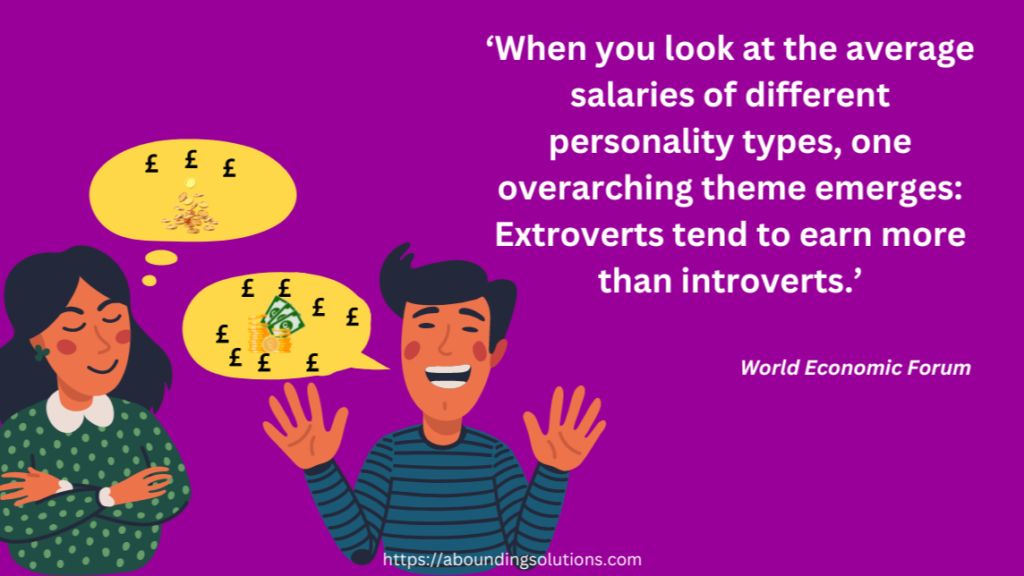You will have heard of the gender pay gap and may even have heard of the ethnicity pay gap, but what about the introvert pay gap and does it even exist?
I first came across the notion that earnings may differ between introverts and extraverts a few years ago. Then, having recently had a post by Harvard Business Review (HBR) about the topic highlighted to me by my connection Janice Moth, the topic piqued my interest again and I decided to dig deeper.
The HBR post states "When comparing two men with a bachelor’s degree, the introvert will earn about $290,000 less than his peer with average extraversion." and links to the following article on their website These 3 Personality Traits Affect What You Earn — but Only After Age 40.
The article explores how personality traits influence lifetime earnings and how these effects vary over time. It refers to research which shows that traits like conscientiousness (being hardworking and organised) and extraversion (outgoing) are not linked to higher earnings early in men's careers but become important in midlife, especially between ages 40 and 60. More agreeable men, however, earn less over their lifetime. Highly educated men benefit significantly more from these traits compared to less educated men.
The writer used data about men from the Terman study, a longitude psychological study that followed over 1000 high-IQ individuals (men and women) from childhood through adulthood. From this data, they found that conscientious, extraverted, and less agreeable men see larger earnings later in life. The impact of these traits is substantial, sometimes exceeding $1 million in additional lifetime earnings, comparable to the earnings difference between high school and college graduates.
The article concluded that personality traits, particularly conscientiousness and extraversion, not only boost productivity but also extend the length and intensity of one’s working life, leading to greater lifetime earnings. The findings suggest that personality becomes more influential as careers progress.
Another study looking at Executive Extraversion: Career and Firm Outcomes found strong evidence that more extraverted CEOs tend to earn 4.56–6.48% more in salary. They also have better career prospects, such as being less likely to lose their jobs, serve on more boards, and hold directorship at larger companies. They also found that extraverted CFOs are more likely to be promoted to CEO.
The results of this study suggest that being extraverted brings several career advantages, even though it’s hard to control for every factor that might influence this. These advantages could come from both the personality trait itself and other factors like past successes or experiences.
However, with this study, researchers used linguistic algorithms based on speech patterns during conference calls to measure executive extraversion, but I don’t think this is necessarily a true reflection of a person’s personality trait.
People could put a different energy into a conversation depending on the nature of the call and who the call is with. This could result in someone who is introverted performing with what is typically associated with being extraverted behaviours.
A conference call conversation may only reflect how the person is in that specific situation rather than their overall personality. They may even be conforming to expected social norms that executives are outgoing, talkative and highly energetic, qualities typically associated with extraversion. If introverts felt compelled to display these traits, that would mean a mismatch between how they are perceived in the study and their actual personality.
In another study that involved men and women in a diverse set of occupations and organisations, the results showed that extraversion was related positively to salary level, promotions, and career satisfaction. Other studies have found that extraversion relates positively to remuneration but only for men and that in the labour market, men are rewarded for extraversion.
The World Economic Forum reports that ‘When you look at the average salaries of different personality types, one overarching theme emerges: Extroverts tend to earn more than introverts.’ It references a report from Truity Psychometrics which found that extraverts dominate the high earning end of the spectrum.
There are a number of factors that determine someone’s earning potential, but given the findings of the above studies, it would suggest that there is a potential earning gap for introverts. Further research is needed to explore and investigate this.
I believe that factors which could contribute to an earning gap are due to misconceptions and unfavourable bias towards introversion, and extraversion being favoured in the workplace. I would be interested to see what the situation is in those cultures where introversion is widely seen as a leadership strength.
It would seem that the issue regarding challenges introverted leaders face is more nuanced and goes far deeper than I had thought, with a lot more work needing to be done to change the narrative and the career experience for introverts.
It also requires introverted leaders to advocate for themselves and secure opportunities at a salary commensurate with that of extraverted counterparts, without having to change who they are.
What do you think? Do you think there is an introvert earnings gap? Have you seen evidence of this? Let me know in the comments. If you know anyone who is researching this topic, please let me know.

